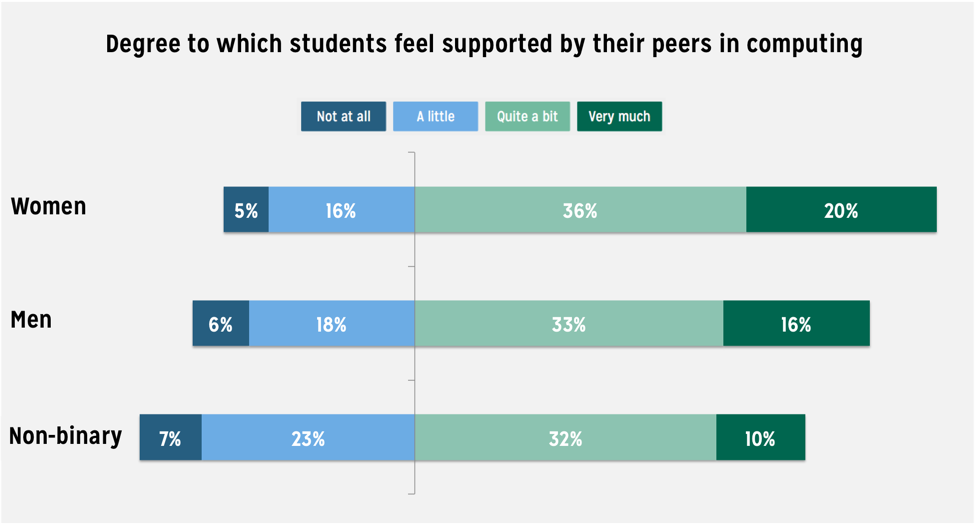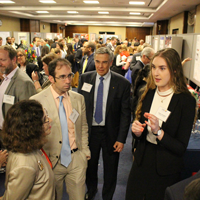Compared to Men And Women, Non-Binary Students Report Lower Levels of Peer Support

Gender identity is complex, and while the majority of people identify as either man or woman, others identify as a non-binary gender (also known as genderqueer or gender non-conforming). When one identifies as non-binary, this means they identify as something other than the traditional binary gender options (i.e., man or woman). Non-binary students may feel marginalized because they fall outside of the “parameters” set by society to act and exist in one way or another [1]. As such, these individuals may experience harassment, discrimination, or micro-aggressions [2] [3].
Using Data Buddies data, CERP explored non-binary computing students’ levels of peer support, or the extent to which students feel they have peers who they can rely on for academic and social support in their undergraduate computing program. Analyses revealed non-binary students in our sample reported lower levels of peer support than men (p < 0.05) and women (p < 0.01). This finding is important, because peer support is linked with positive self-esteem and persistence [4] and retention in science fields [5]. While computing educators cannot force students to support one another, educators can set an example by creating a welcoming and safe environment through the recognition and support of students’ differences. Educators can also encourage collaborative and team-based learning activities so that all students have the opportunity to develop their peer network in the department.
Notes. During the 2016 semester, CERP surveyed 5,923 undergraduate students majoring in a computing field from a sample of computing departments across the United States. Sixty-six percent of the sample identified as men, 33 percent as women, and 2 percent as non-binary genders. Students were asked the following question on a scale from [1] Not at all to [5] Very much: To what extent is each of the following kinds of support available to you from other computing students if you need it: (1) someone to hang out with; (2) someone to confide in or talk to about your problems; (3) someone to get class assignments for you if you were sick; (4) someone to help you understand difficult homework problems. Items were aggregated into a composite variable for the analysis above, Cronbach’s alpha = .89. Students who responded “Somewhat” were not included in the graphic but were included while calculating the percentages within each group. An Analysis of Variance treating gender as an independent variable, and peer support as a dependent variable revealed a statistically significant difference between groups, F(2, 5,868) = 18.50, p < .01. A post hoc Dunnett’s test revealed non-binary students reported weaker peer support (Mean [M] = 3.11, Standard Deviation [SD] = 1.18) compared to men (M = 3.39, SD = 1.09), p < 0.05 and women (M = 3.55, SD = 1.11), p < 0.01.
References.
[1] Gilbert, M. A. (2009). Defeating bigenderism: Changing gender assumptions in the twenty-first century. Hypatia, 24(3), 93-112.
[2] Cho, S., Laub, C., & Wall S. S. M. (2004). Beyond the binary: A tool kit for gender identity activism in schools. Gay-Straight Alliance Network, Transgender Law Center, and the National Gender for Lesbian Rights. Retrieved from: https://gsanetwork.org/files/getinvolved/BeyondtheBinary-Manual.pdf
[3] Ballou, A. (2014). 10 Myths About Non-Binary People It’s Time to Unlearn. Everyday Feminism Magazine. Retrieved from: http://everydayfeminism.com/2014/12/myths-non-binary-people/
[4] Cross, S. E. & Vick, N, V. (2001). The interdependent self-construal and social support: The case of persistence in engineering. Personality and Social Psychology Bulletin, 27(7), 820-832.
[5] Hathaway, R. S., Sharp, S. & Davis, C. (2001). Programmatic efforts affect retention of women in science and engineering. Journal of Women and Minorities in Science and Engineering, 7(2), 107-124.
 This analysis is brought to you by the CRA’s Center for Evaluating the Research Pipeline (CERP). CERP provides social science research and comparative evaluation for the computing community. To subscribe to the CERP newsletter, click here.
This analysis is brought to you by the CRA’s Center for Evaluating the Research Pipeline (CERP). CERP provides social science research and comparative evaluation for the computing community. To subscribe to the CERP newsletter, click here.
This material is based upon work supported by the National Science Foundation under Grant Number (CNS-1246649; and/ or DUE-1431112). Any opinions, findings, and conclusions or recommendations expressed in this material are those of the author(s) and do not necessarily reflect the views of the National Science Foundation.









